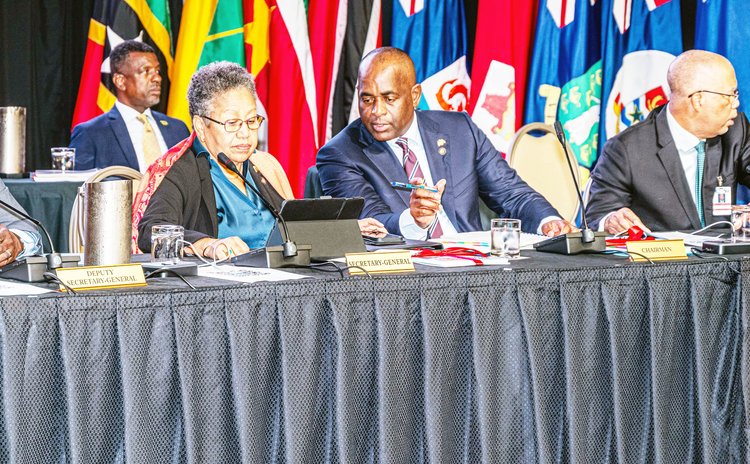CARICOM at 50: there is still hope

July 4, 2023, marks the 50th anniversary of signing the Treaty of Chaguaramas, the foundational document that brought the Caribbean Community and Common Market (CARICOM) into existence. With high hopes and lofty ambitions, the heads of government of the four largest independent Caribbean countries at the time embarked on a journey towards regional integration. They were later joined, to varying degrees of commitment, by ten other countries.
Reflection on the past five decades reveals that CARICOM has fallen short of its initial promises and failed to deliver the deep and meaningful integration envisioned, leading to the often-repeated phrase, "CARICOM and CARI-GONE."
While CARICOM experienced some initial success, establishing institutions like the Caribbean Development Bank and making progress in trade, its history has been characterised by sporadic bursts of activity followed by prolonged periods of inaction. This inconsistent pattern has eroded confidence and faith in the CARICOM project among various sectors of Caribbean society.
Nevertheless, the fact that CARICOM's framework continues to exist is a testament to the enduring belief in the benefits of regional integration. No government dares to withdraw from it, fearing a widespread backlash from within its population.
Despite the revision of the CARICOM Treaty in 2001, which aimed to establish a Single Market and Economy (CSME), progress towards these goals has been painfully slow. Establishing a Customs Union, let alone a Common Market still needs to be realised.
The lack of a comprehensive regional economic framework has hindered the potential for genuine free trade, cross-border company establishment, and the free movement of labour—a vision that once excited the people of CARICOM.
By 2011, the CSME had effectively stalled, with little progress in advancing regional integration. In 2022, CARICOM leaders acknowledged that trade barriers, particularly non-tariff barriers, were significant obstacles to developing a regional market for agricultural produce and inter-regional transportation. The inability to overcome even these challenges, especially air transportation, which suffered due to closed borders during the 2020 COVID-19 pandemic, highlights the significant capacity that CARICOM states have yet to build collectively.
Comparatively, the European Union (EU) countries, which embarked on integration efforts around the same time as CARICOM, have made significant strides. The EU expanded its membership, established a single currency, dismantled border barriers, and empowered a central Commission to make decisions collectively for all member countries. In contrast, CARICOM has limped along, burdened by the inadequate implementation of decisions, mistrust among leaders, institutional decline, and a weak and underfunded Secretariat.
Numerous reports and commissions have carefully examined CARICOM's failures and offered recommendations for improvement. The 1992 West Indian Commission's seminal work, "Time for Action," led by a Caribbean luminary, Shridath Ramphal, called for establishing a Caribbean Commission similar to the European Commission. Despite accepting some recommendations, crucial proposals regarding governance structures, including creating a Caribbean Commission, were largely ignored.
In 2016, the Jamaican government commissioned a review of its relations with CARICOM, headed by Bruce Golding. The commission recommended explicit provisions in the CARICOM Treaty to enforce member states' obligations and ensure the timely implementation of decisions. Yet, once again, these recommendations were largely disregarded, further highlighting the challenges of implementing meaningful reform within CARICOM.
In 2021, a CARICOM Commission on the economy revived discussions on regional integration. It suggested that interested member states should proceed with integration, leaving the door open for others to join at their own pace. However, like its predecessors, this report has not spurred the necessary action.
The dominant characteristic of CARICOM has been the jealous retention of sovereignty by individual governments. In their international bargaining, CARICOM governments only succeed when they act together. But no established machinery exists for mutual relations with external powers and agencies. Thus, ad hoc collective activities have produced beneficial results, but these have been spectacular exceptions, not the consistent rule.
This inclination to maintain decision-making power at the national level has hindered progress. Bureaucrats, too, have perpetuated this culture of nationalism, often prioritising their countries' interests over collective regional welfare. Consequently, CARICOM has struggled to implement regional decisions effectively and act in unison, hampering its ability to achieve its objectives.
The Caribbean Court of Justice (CCJ) is a notable example of this contradiction. Established in 2001 to replace the British Privy Council as the region's final court of appeal, the CCJ has struggled to gain the full support of member states despite the demonstrated high quality of its jurisprudence. Some countries have hesitated to embrace the CCJ due to concerns over losing sovereignty and fear of political interference. As a result, the region has been unable to unify under a single legal system, preventing the CCJ from fulfilling its potential as a symbol of Caribbean unity and independence.
The consequences of limited integration have been significant for CARICOM countries. Research by the International Monetary Fund (IMF) indicates that deeper regional integration could bring substantial economic benefits. By reducing non-tariff barriers and trade costs, CARICOM countries could stimulate trade, restructure their economies, and generate net employment gains. Integration would allow member states to tap into global value chains, attract foreign investment, and enhance their economic potential. The failure to seize these opportunities has come at a cost to the region's development and prosperity.
As CARICOM reaches its 50-year milestone, new challenges face each member states that none can manage effectively alone. Among them are the impact of climate change, including more frequent and intense disasters; new pandemics for which they are ill-prepared; increasing transnational crime; gang violence and the spread of deadly weapons; and narrowing windows to much-needed development funds. All of these developments require more integration, not less.
CARICOM needs a renewed commitment from member states to prioritise collective interests over narrow national concerns. This shift in mindset should be accompanied by concrete actions, such as removing remaining trade barriers, harmonising regulations, and establishing effective governance mechanisms that can enforce regional decisions.
CARICOM must also invest in revamping its institutions, providing them with the necessary expertise, authority, and resources to drive the integration agenda forward. Enhanced regional cooperation and coordination, focusing on effective implementation and enforcement, will be vital to restoring confidence and generating tangible benefits for the people of the Caribbean. Hopefully, 50 years of lessons will not go unlearned. The vision of a fully integrated Caribbean, where borders are irrelevant and collective strength prevails, can still be realised.




